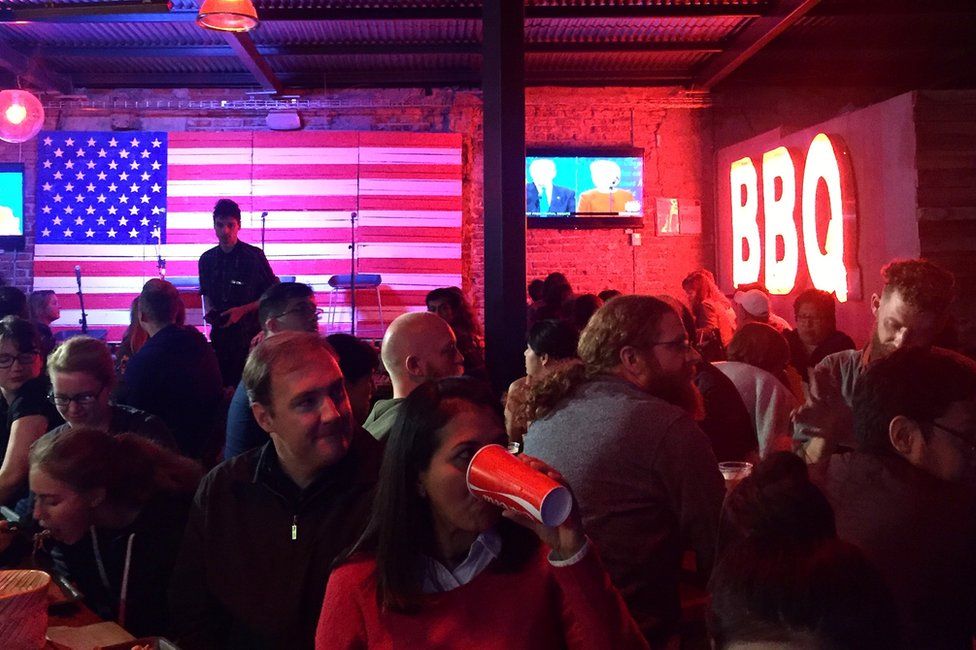US election: How Trump went down in a Mexican BBQ joint
- Published

The polite form of "Pinche Gringo" is "bloody American". It doesn't put off American diners
During last week's third and final presidential debate, the wooden benches at the Pinche Gringo BBQ joint in Mexico City were packed.
The diners tucked into their brisket, ribs and mac 'n' cheese while glued to the television.
It seemed like an appropriate place to watch the political face-off between Donald Trump and Hillary Clinton.
"Pinche Gringo" could not be a more Mexican expression. The polite form would translate as "bloody American" in English. The more coarse version I will leave to your imagination. But it's a sentiment that is felt by many here in Mexico.
During the debate, there were cheers when words such as "Mexico", "immigrant" and "wall" were mentioned. The third debate didn't disappoint in this respect - immigration, crime and drugs were all topics that came up.
While the crowd had its fair share of American citizens, there were also many Mexicans who had come along to watch. Student Carlos Brown was one of them.
"There's too much at play to ignore it," the 28-year-old says.
Carlos was there because he's a politics student but also because there are big issues that worry him - not just the infamous wall but also trade deals that could have a big impact on Mexico.
His friend Paulina agrees. She doesn't think these elections stop at Donald Trump. A Hillary Clinton win would be "symbolically very important" she tells me.
A look back at some of the things Donald Trump has said about Mexicans
In a world where men rule, especially in macho Mexico, seeing a woman represent one of the world's most powerful democracies would do a huge amount of good.
'Horrible trends'
The interest in US politics among Mexicans is new - and a positive side-effect of this year's elections, according to Jorge Castaneda, Mexico's former foreign minister.
It is no longer just politicians, journalists and academics who are paying attention to politics north of the border.
"This time there has really been widespread interest reaching across all sectors of society and this is thanks to Trump," he says.
"In a sense it's a very positive development because practically no country in the world with the possible exception of Israel is as affected by what happens in the US as Mexico is."
But there are negatives that have emerged too.
"We thought the bigotry, the racism, the xenophobia, the nativism, all those horrible trends, were part of American society but only on the fringe - a minority," says renowned Mexican historian and writer Enrique Krauze.
Donald Trump caricatures at the "Wall of Caricatures" exhibition in Mexico City
"But that minority is a huge minority - 40%. I have no doubt that a lot of damage has been done and it will take many, many years - perhaps a generation [to repair]."
Among the Mexicans I met at Pinche Gringo, some recently studied in the US. They may have had a legal right to be there but they still felt discriminated against.
"Just imagine what undocumented migrants feel like," says Atenea Rosado, a 26-year-old who was, until January, studying human rights education at Columbia in New York.
The overwhelming hope here in Mexico is that Hillary Clinton will win. But even then, the country's relationship with the US may continue to be strained.
"There is going to be a great deal of anti-Mexican feeling in the US on the part of Trump supporters," says Jorge Castaneda.
"They are not going to be happy campers when they lose, especially if they lose overwhelmingly and especially if Trump convinces them that the election was rigged. They will take some of that out against Mexicans."
'Love-hate'
Beyond the wall, immigration reform and revision of trade accords like the North American Free Trade Agreement, external could still be up for discussion.
The Trump pinata has become a familiar form of abuse in Mexico
"You will have a Democratic majority in the Senate, maybe in the House. These people are clearly anti-Trans-Pacific Partnership and pro-Nafta revision, they are not big supporters of further integration and there will be some real issues there," says Mr Castaneda.
But he does see one positive.
"Obama has been soft on human rights in Mexico and I think Hillary will be tougher and I think that will be a very good thing," he says.
While many Mexicans see the elections as having damaged the relationship between the two countries, Prof Silvia Nunez Garcia, from the Centre for North American Research at the National Autonomous University of Mexico, thinks otherwise.
"We are using a very negative approach to what is happening. I really think we need to look outside the box," she says.
"First of all, we Mexicans should not be interfering in domestic politics in the US - that used to be one of our most valuable principals in foreign policy. Now we do exactly the opposite.
"There will be consequences for these actions. But the situation in the US is giving us a huge opportunity to be self-critical."
She says: "Our relationship with America is a very contradictory one. We tend to say it's love-hate and this is because we do not know each other really."
The message is that these elections could prove an opportunity to get to know other countries and make new friends instead.
What happens next?
The two candidates will spend the remaining 18 days before the election criss-crossing the US in their bid to persuade undecided voters. Expect to see lots of appearances in battleground states such as Ohio, North Carolina, Florida and Pennsylvania.
Voters will go to the polls on Tuesday 8 November to decide who becomes the 45th President of the United States
The new president will be inaugurated on 20 January 2017

